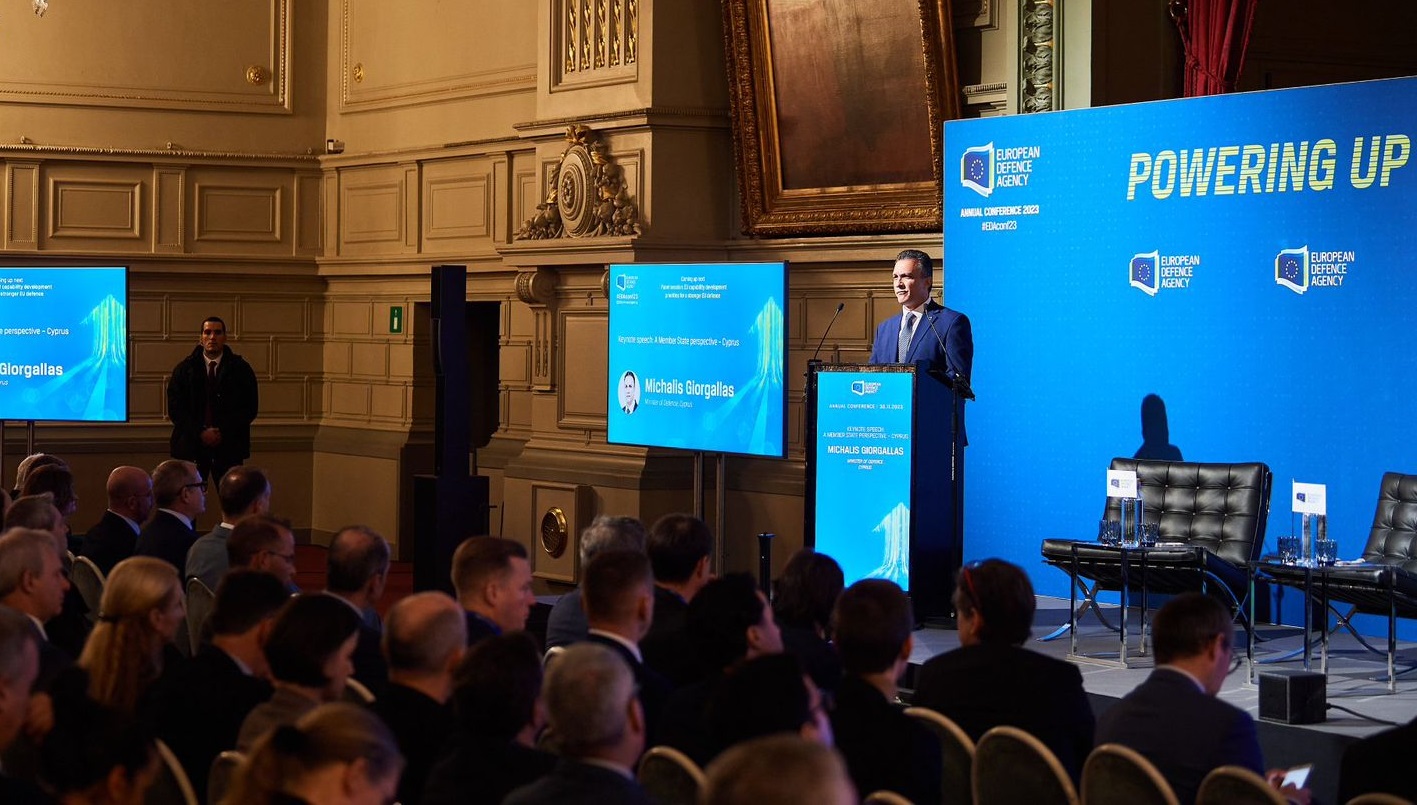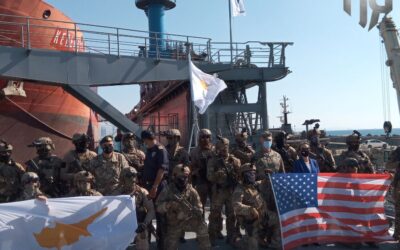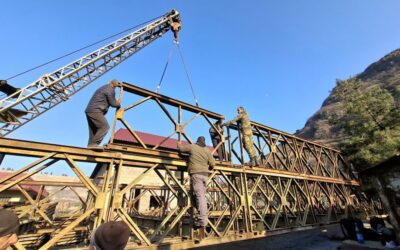Προεδρική Απόφαση για την ένταξη της Κυπριακής Δημοκρατίας σε τρία αμυντικά προγράμματα των ΗΠΑ υπέγραψε ο Αμερικανός πρόεδρος…

Ο Υπουργός Άμυνας Μιχάλης Γιωργάλλας συμμετείχε σήμερα στο Ετήσιο Συνέδριο του Ευρωπαϊκού Οργανισμού Άμυνας – EDA ANNUAL CONFERENCE 2023: Powering up European Defence, η οποία πραγματοποιήθηκε στις Βρυξέλλες.
Μέσω αυτού εκφράστηκε η ανάγκη και η δέσμευση ενδυνάμωσης των ευρωπαϊκών αμυντικών δυνατοτήτων της Ευρωπαϊκής Ένωσης.
Στο πλαίσιο του συνεδρίου ο Υπουργός Άμυνας εκφώνησε την ακόλουθη ομιλία, στην οποία παρουσίασε τη δική μας προοπτική στα θέματα που σχετίζονται με την άμυνα και την ασφάλεια της Ευρωπαϊκής Ένωσης.
Διαβάστε επίσης: Φωτογραφίες από την απονομή του Πράσινου Μπερέ και την αποφοίτηση των Στρατονόμων
«It is a great honour and privilege to address the EDA Annual Conference and share, from the perspective of Cyprus, some thoughts on how we can work together to power up European Defence.
First, allow me to congratulate the EDA for organizing this event and commend the Agency for its commendable work.
With the establishment of the EDA back in 2004, member states took an important step towards developing and sustaining European defence capabilities.
We find ourselves at a significant and critical geopolitical juncture.
As emphatically stated in the Versailles’ Declaration, Russia’s war of aggression against Ukraine constitutes a tectonic shift in European history.
This invasion undoubtedly marked a watershed moment and a game-changer for global and European politics.
Allow me to say that, Cyprus knows only too well what it means to be the victim of armed aggression by a bigger neighbour.
We experience, almost daily, the spectrum of both conventional, symmetric but also asymmetric, hybrid threats, including the instrumentalization of migration.
The Turkish illegal invasion bears many common characteristics with the Russian invasion of Ukraine.
The ongoing occupation of part of our territory, with a significant presence of Turkish occupying troops presents a constant threat to our country.
To respond to this challenging threat environment, we need to maintain a deterrent force with credible capabilities.
The large-scale conventional Ukrainian war unfolding near the European borders and the recent developments in Israel bluntly highlight threats to Europe’s security.
Moreover, the political instability in the African continent, the succession of coups d’ etat in the Sahel, the Armenia-Azerbaijan conflict, and the tensions in the Western Balkans that persist, underscore, more than ever, the urgent need for our comprehensive European defense strategy, well-reflected in the Strategic Compass to be implemented.
In the current turmoil and instability, Europe needs to become more independent.
The European Union needs to reduce any dependencies, especially those that originate from possible competitors.
Such dependencies pose a considerable threat to our own stability and internal cohesion as a Union.
Our objectives aim to realize a robust economic base in an energy independent European Union.
Α Union which could develop its own sufficient defence capabilities.
Adapting existing capabilities that address conventional threats and developing new ones to counter hybrid threats are imperative.
These threats can undermine the foundations of our societies and significantly jeopardize our efforts for stability and prosperity.
This is a collective effort that demands collaboration and coordination among all Member States to succeed.
A spectrum of high-tech capabilities, ranging from cyber-defence to strategic communications to intelligence, should be jointly developed not only to standardize but also to enhance interoperability.
Investing in cutting-edge and disruptive technologies for dual use and defence purposes must be an indispensable part of our strategy.
Now is the time to utilize all available mechanisms to strengthen the European Defence Technological and Industrial Base while simplifying procedures and offering more incentives for collaboration and joint programs to reduce existing fragmentation.
The security ramifications of the unfolding crisis in Europe’s southern neighborhood and ongoing crisis in the north provide important input for reflection on our future capability development.
The aim should be to increase our resilience and build capacities for a Europe that protects and defends its citizens.
Resilience is a key concept and can be seen as the internal aspect of European Strategic autonomy.
Simply put, it is our ability to cope with the impact of crises that can be multiple and intersecting.
In this respect, energy and maritime security are crucial.
These domains require a vast range of capabilities, including military mobility, to ensure security of supply and the protection of critical infrastructure.
As demonstrated by the Ukrainian crisis, the security of supply during operations is of utmost importance, a capability achievable only with a robust and viable defence industry.
In the vibrant defence ecosystem of the European Union, SMEs can be a hotbed of innovation.
SMEs form an integral part of this ecosystem as recognized by the European Commission and the EDA.
We would advocate for taking more measures to support SMEs which would allow us to better capitalize on the synergies between the civilian, security and defence domains.
In recent years, Cyprus’ defence SMEs have specialized in cutting-edge technologies such as cyber-defence, tactical to strategic communications, maritime surveillance, intelligence, and unmanned vehicles.
The pace of the progress came, if I may say, as a very pleasant surprise.
Cyprus is the EU Member State closest to the region and our geographic location, our extensive ties with the countries and people of the region give us, I believe, a particular insight into developments.
We are monitoring the events closely and with concern.
We have activated our National Plan ESTIA to prepare for the evacuation of civilians from conflict zones in Israel and Lebanon.
It might unfortunately become necessary to evacuate a very high number of European citizens and in this eventuality, this will happen through the Republic of Cyprus.
Therefore, our infrastructure has been made available to forces from more than 26 countries.
One of our priorities is to further develop and expand Cyprus’ capabilities to support humanitarian operations not only for NEO operations but also for other peace and humanitarian nature related operations, in our region.
These capabilities could underpin the functions of a forward logistical and operational base, allowing the Union to fulfill CSDP mandates in the service of peace and stability.
Such sufficient facilities in strategically positioned forward locations supported by advanced logistical abilities are vital for the Union to be able to respond with the required speed and agility to the necessary tasks for any kind of operation.
The multiple crises and conflicts unfolding right now in the European neighbourhood show that whilst the attention of Europe should sustain its focus on Ukraine it should not neglect the southern neighbourhood.
The impact of such crises on European civilians and the ability to respond adequately to the humanitarian aspects of such crises should form a key part of our development planning and on this I would like to commend the crucial role played by the EDA in Europe’s capability development.
I hope that I have provided some food for thought, some points for further reflection with this brief exposition.
Let me conclude by saying that Cyprus will remain a committed supporter of the EDA, acknowledging its crucial role as an integral part of European defense.
Thank you very much for your attention».
Διαβάστε επίσης: EDEX 2023 | Παρούσα η Κύπρος και η Ελλάδα στην μεγάλη έκθεση Άμυνας και Ασφάλειας στο Κάϊρο
ΔΙΑΒΑΣΤΕ ΕΠΙΣΗΣ
Ο Ελληνικό Στρατός τοποθετεί γέφυρες στην Αρμενία σε πληγείσες περιοχές από πλημμύρες
Προσωρινές σπονδυλωτές γέφυρες τύπου «ΜΠΕΛΕΫ M2» σε περιοχές της Περιφέρειας LORI της βόρειας Αρμενία που είχαν πληγεί από τις πλημμύρες…
Συστάθηκε το Κυπριακό Συμβούλιο Αμυντικής Βιομηχανίας – Τα μέλη και οι αρμοδιότητες
Το Συμβούλιο θα έχει συμβουλευτικό χαρακτήρα με κύρια αποστολή να εισηγείται τις βασικές επιλογές κατά τον προγραμματισμό…
Η Κύπρος εντάσσεται σε τρία αμυντικά προγράμματα των ΗΠΑ
Προεδρική Απόφαση για την ένταξη της Κυπριακής Δημοκρατίας σε τρία αμυντικά προγράμματα των ΗΠΑ υπέγραψε ο Αμερικανός πρόεδρος…
Το 95,7% των Κυπρίων ψηφίζει Ένωση με την Ελλάδα – 75 χρόνια από το Ενωτικό Δημοψήφισμα του 1950
Συμπληρώνονται σήμερα 75 χρόνια από το δημοψήφισμα της 15ης Ιανουαρίου 1950, όπου σύσσωμος ο λαός της Κύπρου ψήφισε Ένωση…
Λιθουανία | Μεταφορά 4.500 drones στην Ουκρανία
Αυτή την εβδομάδα, η λιθουανική κυβέρνηση θα παραδώσει 4.500 drones στην Ουκρανία, τα οποία αγοράζονται επίσης…
Ο Ελληνικό Στρατός τοποθετεί γέφυρες στην Αρμενία σε πληγείσες περιοχές από πλημμύρες
Προσωρινές σπονδυλωτές γέφυρες τύπου «ΜΠΕΛΕΫ M2» σε περιοχές της Περιφέρειας LORI της βόρειας Αρμενία που είχαν πληγεί από τις πλημμύρες…
Σήμερα η Εσπερίδα για την Ανατολική Μεσόγειο και την Κύπρο στο Πανεπιστήμιο Νεάπολις στην Πάφο
Οι ομιλητες θα αναλύσουν διάφορες πτυχές της γεωπολιτικής κατάστασης στην περιφέρεια της Ανατολικής Μεσογείου, τον ρόλο και τις στρατηγικές…
Συστάθηκε το Κυπριακό Συμβούλιο Αμυντικής Βιομηχανίας – Τα μέλη και οι αρμοδιότητες
Το Συμβούλιο θα έχει συμβουλευτικό χαρακτήρα με κύρια αποστολή να εισηγείται τις βασικές επιλογές κατά τον προγραμματισμό…















